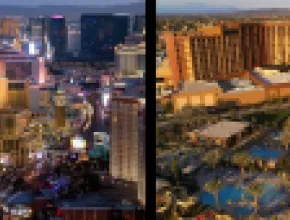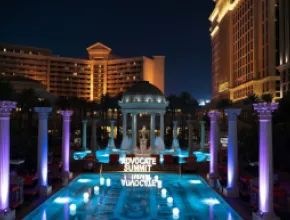Across the heartland, the casino building boom has left a legacy of new and expanded entertainment and gathering hubs. Massive waterfront palaces with hotels, ballrooms and event centers have replaced traditional riverboats. States such as Indiana, Iowa and Missouri have issued licenses for more casinos.
While construction has slowed recently, the upgrading of many casino properties continues. At the same time, casinos are under construction in Illinois and Kansas, the newest gaming state.
Indiana
The Hoosier State’s gaming revenues of $2.8 billion last year were a 4.9 percent increase over 2008, according to the American Gaming Association. It was the first full year of operation for its two racinos (racetrack casinos).
The state has one land-based and 10 lake- and river-based casino facilities. Five are part of the Chicago market, where two have undergone major expansions.
Horseshoe Hammond opened its $500 million expansion in summer 2008, doubling its size, increasing its slot count to 3,200 and adding a 4,000-seat entertainment facility and new restaurants.
Early last year, Boyd Gaming completed a $103 million expansion of the Blue Chip Casino, Hotel & Spa in Michigan City by adding 302 guest rooms, a spa and the Stardust Event Center, which includes a 15,000-square-foot ballroom.
Four casinos are in the southeast on the Ohio River, two of which have undergone rebranding.
Last year, Penn National Gaming completed a $300 million expansion of its 300-room Hollywood Casino Lawrenceburg, the former Argosy, doubling its 3,700-slot gaming area. This happened a year after the 503-room Horseshoe Southern Indiana, the former Caesars Indiana, completed a $53 million renovation.
Indiana’s first land-based casino is at the $500 million French Lick Resort in Southern Indiana, which began opening in phases four years ago.
Illinois
The Prairie State’s nine dockside casinos are all on rivers. Four are part of the Chicago market. Illinois’ gaming revenues dropped 8.9 percent last year to $1.4 billion.
Construction began in April in Des Plaines, 16 miles from downtown Chicago, on Midwest Gaming & Entertainment’s $445 million, 147,000-square-foot casino and entertainment complex, expected to open in summer 2011. Held up by 12 years of court battles, it will be the last casino currently allowed for development in the state.
"By the time we are done with construction, we will have created hundreds of construction jobs, approximately 1,000 permanent jobs and several hundred million dollars in economic activity—all of this as Illinois is battling back from the worst economy in decades," says Greg Carlin, Midwest Gaming & Entertainment CEO.
Penn Gaming’s 100-room Empress Casino Hotel in Joliet reopened last year after being closed for three months following a fire that destroyed its land-based pavilion. A new permanent pavilion with restaurants is expected to open late this year as part of an $81 million upgrading.
The state’s newest casino hotel, Jumer’s Casino & Hotel, opened in Rock Island on the Mississippi River in December 2008. Replacing a riverboat casino, it includes 216 rooms and a 700-seat multipurpose event center.
In September, Delaware North Companies announced it was acquiring the privately owned Jumer’s for $180 million.
"Jumer’s has everything we look for in a gaming destination and will be an excellent addition to our expanding portfolio of gaming assets," says William Bissett, president of Delaware North Companies Gaming & Entertainment.
Missouri
The Show Me State’s gaming revenues increased 2.9 percent last year to $1.7 billion.
In March, Pinnacle Entertainment opened the state’s 13th riverfront casino, the $380 million River City Casino in Lemay, 10 miles south of downtown St. Louis overlooking the Mississippi. The first phase of the project, which will eventually include a hotel, features 2,100 slots, table games and seven restaurants and lounges.
Pinnacle also has downtown St. Louis’ 2,000-slot Lumière Place casino hotel complex, which debuted almost three years ago, and includes the 200-room Four Seasons Hotel St. Louis and the 294-room HoteLumiere.
It also operated the nearby President Casino, which closed in June. Missouri is expected to award the gaming license, for which a reported five casino projects are competing, to another operator by year’s end.
For the first half of the year, revenues generated by Pinnacle’s St. Louis properties increased 47 percent over the same period last year.
St. Louis also has the 500-room Harrah’s St. Louis, Maryland Heights with 12,000 square feet of meeting space. Located 20 miles north is the 3,300-slot Ameristar Casino St. Charles, which has 19,200 square feet of conference space and a 400-room, all-suite hotel.
Among the five Kansas City casinos is the 184-room Ameristar Casino Hotel Kansas City, which has meeting space for up to 450 people. Another 100 rooms are set to be added in a $14 million expansion targeted for a fourth quarter 2011 completion.
"The timing is perfect. Ameristar has led the market for nearly seven consecutive years and our hotel occupancy is strong," says Sean Barnard, the hotel’s senior vice president and general manager, noting that the Missouri Gaming Commission recently approved 24-hour gaming.
Kansas
Kansas authorized four commercial casinos in each of four designated regions in 2007.
The state’s first commercial casino, the $48 million, 584-slot Boot Hill Casino & Resort, opened last December in Dodge City. A second phase scheduled for completion in December 2011 will add a 124-room hotel, a 3,000-square-foot spa, a 20,000-square-foot entertainment venue and 15,000 additional square feet of gaming and dining.
At Kansas Speedway, west of downtown Kansas City, Mo., construction started in April on the second casino—the $410 million, 2,300-slot Casino Hollywood. Opening in 2012, it is a joint venture between Penn National and the speedway. It will include a hotel and shopping center in the second phase of expansion.
Iowa
The Hawkeye State’s gaming revenue declined 2.8 percent last year to $1.4 billion after several years of substantial gains resulting from growth from casino expansion and development. Iowa has seven riverboat casinos, seven land-based casinos, three racinos and three Native American casinos.
Four that opened in 2006 and 2007 are the 70-room Wild Rose Casino & Resort in Emmetsburg, the 200-room Riverside Casino & Golf Resort south of Iowa City, the 194-room Isle Casino & Hotel Waterloo and Diamond Jo Casino in Northwood.
Meetings-equipped expansions followed in 2008 as operators replaced riverboat casinos. They include the 60-room Wild Rose Casino & Resort in Clinton, the Diamond Jo Casino Dubuque and the 40-suite Catfish Bend Casino in Burlington.
Council Bluffs has the Horseshoe Casino with a greyhound track. In October last year it opened an adjoining 153-room Hilton Garden Inn. The city also boasts the 250-room Harrah’s Council Bluffs and the 160-room Ameristar.
Michigan
Michigan has three commercial casinos, all in Detroit, which produced gaming revenues of $1.3 billion last year.
As part of their agreement with the city when they opened in 1999 and 2000, they were each to build 400-room hotels. Along with casino expansions, all three hotels opened between 2007 and early 2009.
The last to debut was the 400-room Greektown Casino Hotel, with 25,000 square feet of meeting space. The $200 million project included new restaurants and casino expansion.
MGM Grand Detroit’s $800 million complex includes a 400-room hotel, a 30,000-square-foot event center and a variety of restaurants and lounges.
Following a $300 million expansion, the 400-room MotorCity Casino Hotel has meeting space that includes an 11,890-square-foot ballroom and a 1,200-seat theater.
In 2008 near Traverse city, the Grand Traverse Band of Ottawa and Chippewa Indians opened the 137-room Turtle Creek Casino & Hotel, which has 4,500 square feet of meeting space. The tribe also owns the 660-room Grand Traverse Resort and Spa, which has 85,000 square feet of meeting space.
Minnesota
The Land of 10,000 Lakes has more than 30 Native American casinos.
The newest expansion is at the Seven Clans Red Lake Casino in the northwestern part of the state, which earlier this year added a 40-room hotel and an event center seating 400 for banquets.
In 2008, the 480-room Treasure Island Resort & Casino in Red Wing expanded with a 30,000-square-foot event center and 230 additional guest rooms, and Black Bear Casino Resort near Duluth completed a $120 million expansion, adding a new casino, a 250-room hotel and a 17,650-square-foot events center.
Properties with substantial event space include the 600-room Mystic Lake Casino Hotel near the Twin Cities, the 494-room Grand Casino Mille Lacs in Onamia, the 281-room Grand Casino Hinckley, the 390-room Shooting Star Casino Hotel in Mahnomen and the 89-room Prairie’s Edge Casino Resort in Granite Falls.
Wisconsin
In Milwaukee, the Potawatomi Bingo Casino unveiled an 11,000-square-foot ballroom last year, completing a $240 million expansion.
Meetings-friendly Wisconsin casino properties include the Oneida Nation’s 408-room Radisson Hotel & Conference Center in Green Bay and the 315-room Ho-Chunk Casino Hotel & Convention Center in Wisconsin Dells, each with around 30,000 square feet of available meeting space.
North Dakota
North Dakota has 15 Native American gaming facilities.
The 124-room Spirit Lake Casino & Resort in St. Michael completed a renovation and expansion early this year that included two new ballrooms each seating 200, a new executive conference room and a renovated lobby and auditorium.
Tony Bartlett has been writing for travel industry publications for over 20 years.






